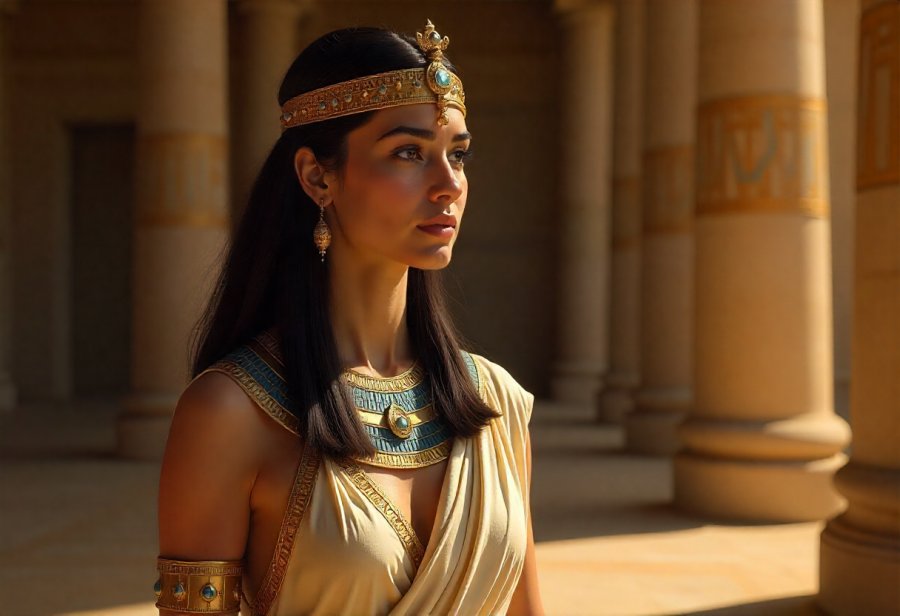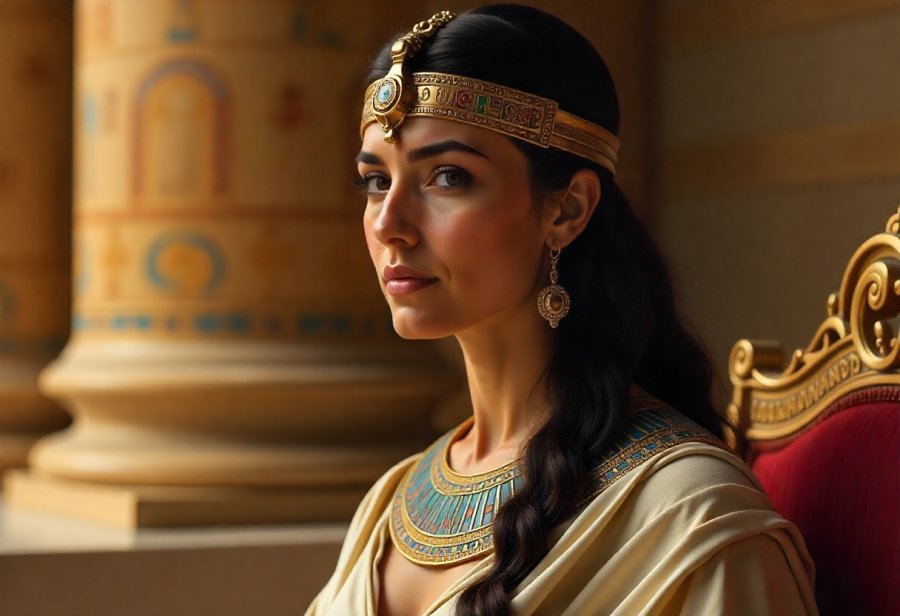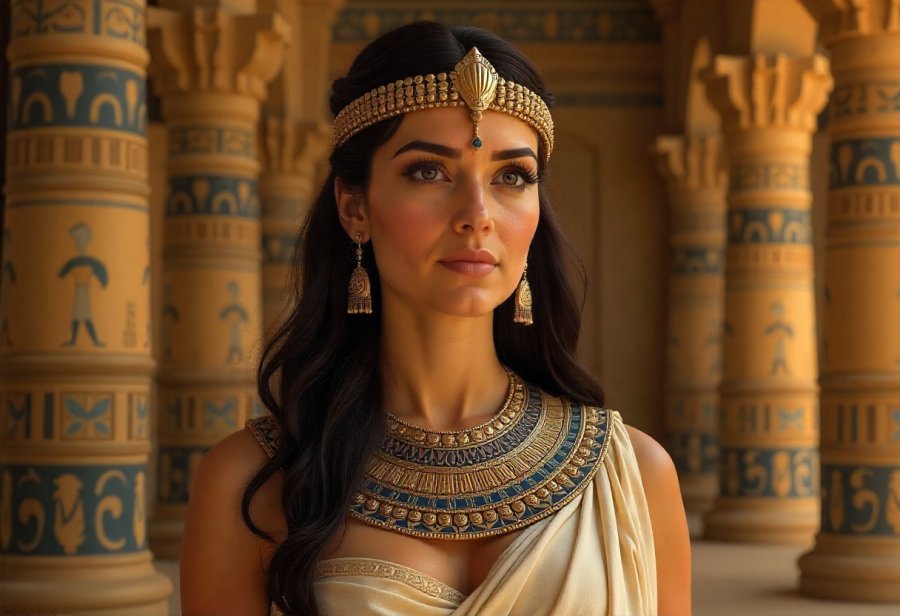Cleopatra VII is often remembered through stories of romance and glamour, but her true legacy lies in her formidable intellect and strategic leadership. She was not merely a beautiful figure of legend; she was a shrewd ruler who mastered diplomacy, cultural influence, and political foresight to navigate Egypt through turbulent times. Fluent in multiple languages and deeply engaged in arts, sciences, and philosophy, Cleopatra saw knowledge as a vital tool for power. Her alliances with Julius Caesar and Mark Antony were calculated moves to preserve Egypt’s independence, not just personal pursuits. Her mastery of internal politics, external diplomacy, and cultural patronage created a resilient and influential reign. Cleopatra’s legacy challenges us to see leadership as rooted in wisdom, adaptability, and cultural savvy—powerful qualities that continue to inspire. Could her true impact be the enduring strength of her mind, proving that influence stems from insight rather than superficial glamour?

Unveiling Cleopatra: Beyond Beauty to Strategic Brilliance
Cleopatra VII is often remembered through stories of romance and glamour, but her true legacy runs much deeper—centered on her sharp mind and strategic leadership. She was not merely a beautiful figure of legend; she was a highly intelligent ruler who skillfully navigated Egypt through some of its most turbulent times. Her ability to forge alliances, manage internal rivalries, and resist the expanding influence of Rome was rooted in her keen understanding of power and diplomacy.
From the beginning, Cleopatra demonstrated that influence stems from wit, knowledge, and strategic thinking. Fluent in multiple languages, including Egyptian, Greek, and Latin, she communicated directly with a diverse array of allies and enemies. This linguistic skill gave her a significant advantage in diplomacy, allowing her to build relationships based on mutual understanding rather than superficial charm alone. Her insatiable curiosity extended into philosophy, literature, sciences, and mathematics, reflecting her belief that knowledge was essential for effective leadership.
Her education and strategic mindset set her apart from many of her contemporaries. When her father, Ptolemy XII, died, Cleopatra inherited a fragile throne beset by internal rivalries and external threats. She responded swiftly, employing diplomacy and forming vital alliances, most notably with Julius Caesar and Mark Antony. These relationships were calculated moves designed to safeguard Egypt’s independence, not personal pursuits of romance. Cleopatra understood that influence often came from the ability to think several steps ahead and to leverage her intelligence in pursuit of her kingdom’s stability.
Throughout her reign, Cleopatra’s leadership was characterized by cultural sophistication, intellectual curiosity, and diplomatic finesse. She patronized Alexandria’s renowned library and engaged directly with scholars, fostering an environment of learning and innovation. This cultural engagement reinforced her authority, demonstrating that a ruler’s strength extends beyond military might to include wisdom, education, and cultural influence. Cleopatra’s mastery of these areas made her a figure of resilience and strategic insight, capable of adapting to the shifting political landscape.
Her story isn’t just about legendary beauty or romantic legends; it’s about a ruler who believed that true influence arises from understanding human nature and wielding knowledge wisely. Cleopatra’s legacy challenges us to see leadership as a blend of insight, adaptability, and cultural awareness—lessons that remain relevant today. Her life exemplifies how intelligence, resilience, and strategic thinking can shape history and leave a lasting impact.
Ancient Egypt’s Turbulent Foundations and Cleopatra’s Cultural Heritage
Cleopatra VII’s rise to power did not happen in isolation; it was shaped by a complex mix of history, culture, and shifting political forces. Born in 69 BCE in Alexandria, she inherited a throne already beset by internal rivalries and external threats. Her Macedonian Greek heritage placed her at the crossroads of Egyptian tradition and Hellenistic influence. The Ptolemaic dynasty, established after Alexander the Great’s conquest, blended Greek customs with native Egyptian practices, creating a unique cultural identity that Cleopatra would later leverage to legitimize her authority.
The political landscape she faced was turbulent and uncertain. Egypt, once a vast empire, was now a fragile kingdom caught between internal factions eager to seize power and an expanding Rome exerting its influence across the Mediterranean. Cleopatra’s accession came at a time when Egypt’s independence was under threat, making strategic diplomacy and alliances vital for survival. Her ability to navigate this environment depended on understanding both her internal court’s rivalries and the broader geopolitical shifts in the region.
From a young age, Cleopatra was immersed in education and cultural refinement. Fluent in Egyptian, Greek, and Latin, she communicated directly with a diverse array of allies and adversaries. Her interest in philosophy, sciences, arts, and literature was more than personal curiosity; she believed that knowledge was a cornerstone of effective leadership. This intellectual foundation equipped her with a strategic mindset that would serve her well in forming alliances and resisting external encroachment.
Her diplomatic skills became central to her reign. The relationships she cultivated with Julius Caesar and Mark Antony were not merely personal but calculated political moves aimed at strengthening Egypt’s position. These alliances helped legitimize her rule internally and provided military support against rivals. Cleopatra understood that influence relied on timing, cultural diplomacy, and the ability to turn opponents into allies—lessons rooted in her deep understanding of power dynamics.
Throughout her reign, Cleopatra combined Greek traditions with Egyptian customs, creating a distinctive cultural persona that resonated across diverse audiences. Supporting Alexandria’s renowned library and engaging with scholars, she fostered an environment of learning and innovation. This cultural engagement reinforced her legitimacy and demonstrated that true power extended beyond military might to include wisdom, education, and the arts.
Her mastery of internal politics and external diplomacy showcased her resilience and adaptability. Cleopatra’s ability to stay several steps ahead of her rivals, leveraging her intelligence and cultural influence, prolonged her reign far longer than many expected. Her leadership exemplifies the importance of strategic thinking and cultural savvy in navigating turbulent times, leaving a legacy that continues to inspire.

The Pillars of Power: Intelligence, Diplomacy, and Strategy
Cleopatra’s leadership was rooted in a keen blend of intelligence, diplomatic finesse, and strategic insight. She understood that true influence was less about asserting raw power and more about navigating a web of human and political relationships with subtlety and skill. Her ability to assess situations swiftly and adapt her approach made her a master tactician, always staying several steps ahead of her rivals. Whether managing internal court rivalries or external threats from Rome, Cleopatra relied on her understanding of power dynamics to preserve her authority and safeguard her kingdom’s future.
Diplomacy was at the heart of her leadership style. Cleopatra excelled at cultural diplomacy, knowing when to persuade, negotiate, or build alliances. Her relationships with Julius Caesar and Mark Antony weren’t just personal—they were meticulously crafted political strategies. She positioned herself as a capable, mutually beneficial partner, turning potential enemies into allies through wit and intelligence. Her charisma and sharp negotiation skills enabled her to sway even the most hardened opponents, reinforcing her influence across diverse audiences.
Strategic thinking was another cornerstone of her reign. Cleopatra was adept at reading her enemies and timing her moves carefully. She leveraged every advantage—her multilingual abilities, her knowledge of arts and sciences, and her cultural authority as a pharaoh. Her alliances with Rome’s most powerful men weren’t accidental; they were deliberate steps designed to reinforce Egypt’s independence. Staying several moves ahead allowed her to outmaneuver rivals and extend her reign longer than many expected, demonstrating her mastery of foresight and adaptability.
Her scholarly pursuits complemented her political acumen. Cleopatra’s engagement with philosophy, literature, and sciences reflected her understanding that knowledge was a form of power. Supporting Alexandria’s famed library and engaging with scholars created an environment of learning and innovation that strengthened her decision-making. This cultural investment wasn’t just personal curiosity—it was a strategic move to bolster her resilience and maintain Egypt’s prominence as a hub of knowledge and influence.
Throughout her reign, Cleopatra exemplified how intelligence, diplomacy, and strategic insight combine to create enduring power. Her leadership was a seamless blend of wit and wisdom, underscoring the importance of understanding human nature and timing in influence. Her mastery of these elements made her a resilient, formidable ruler—one whose legacy continues to inspire leaders to value knowledge, cultural awareness, and strategic thinking as the true sources of authority.
For those interested in exploring more about her strategic mastery and influence, you can read about Cleopatra’s leadership at Cleopatra’s Leadership and Influence. Understanding her methods offers valuable insights into how intelligence, diplomacy, and strategy intertwine to create lasting power.
Leadership Lessons from Cleopatra: Influence, Diplomacy, and Wisdom
Cleopatra’s leadership offers timeless lessons that remain deeply relevant today, especially in how influence is built through wit, strategy, and cultural understanding. Her ability to navigate complex political landscapes shows that intelligence and diplomacy often outweigh sheer force. Leaders can learn from her skill in forging alliances based on mutual trust and benefit, recognizing that strong relationships tend to be more enduring than raw authority alone.
Her partnerships with Julius Caesar and Mark Antony exemplify this principle. These alliances weren’t simply personal choices; they were calculated moves aimed at securing Egypt’s independence and stability. Cleopatra understood that persuasion and cultural diplomacy could be as powerful as military might. By positioning herself as a capable and strategic partner, she transformed potential enemies into allies, demonstrating that influence hinges on genuine relationships and effective communication.
Cultural intelligence played a crucial role in her success. Cleopatra’s ability to blend Egyptian traditions with Greek culture created an identity that resonated across diverse audiences. This cultural finesse fostered loyalty among her subjects and admiration from her allies, reinforcing her legitimacy. Supporting Alexandria’s legendary library and engaging directly with scholars weren’t just personal pursuits—they were strategic investments in knowledge that strengthened her leadership and decision-making.
Her scholarly pursuits weren’t isolated interests; they served as vital tools for effective governance. Cleopatra believed that mastery of sciences, arts, and philosophy could enhance her ability to lead wisely. By fostering an environment of learning and innovation within her court, she built resilience and adaptability into her kingdom’s fabric. Modern leaders can draw inspiration from her example, valuing continuous learning and cultural fluency as essential components of influence.
Managing internal rivalries and external threats required calm resilience and strategic foresight. Cleopatra’s steady approach allowed her to turn crises into opportunities, demonstrating that decisive, informed action often surpasses impulsive responses. Her ability to stay composed under pressure and leverage her intelligence for strategic advantage highlights a timeless leadership trait—calm confidence combined with sharp insight.
Her legacy underscores that influence is rooted in the mind. Cleopatra’s mastery of diplomacy, scholarship, and strategic thinking created a lasting impact that transcends her time. Her example reminds us that true power involves understanding human nature, timing, and the deliberate cultivation of relationships. Embracing these principles can help modern leaders foster sustainable influence and resilience.
Viewing Cleopatra as a thinker and strategist first, rather than just a romantic icon, reveals a leader who understood that long-term impact depends on wisdom, cultural awareness, and strategic foresight. Her life encourages us to value knowledge and adaptability as the true sources of authority. Her story continues to inspire, illustrating that the most influential leaders are those who lead with clarity, purpose, and a deep understanding of the complexities around them.

Redefining Legacy: Cleopatra as a Mastermind of Influence and Resilience
Cleopatra’s legacy goes far beyond the romantic tales and glamorous legends that often overshadow her true significance. At her core, she was a master strategist and a leader whose influence was rooted in intelligence, cultural sophistication, and diplomatic skill. Her ability to guide Egypt through turbulent times relied on forming strategic alliances, managing internal rivalries, and resisting the relentless expansion of Rome. These achievements stemmed from her keen mind and deep understanding of power dynamics, proving that true leadership is as much about insight as it is about authority.
Far from being defined solely by her relationships with Julius Caesar and Mark Antony, Cleopatra’s strength lay in her mastery of influence through knowledge and diplomacy. She understood that enduring power comes from a well-informed mind, cultural finesse, and impeccable timing. Her patronage of Alexandria’s legendary library and her engagement with scholars weren’t just personal pursuits—they were deliberate strategies to strengthen her decision-making and reinforce her legitimacy as a ruler. Her investments in learning and culture were essential tools, helping her uphold Egypt’s independence and prominence amid chaos.
Her resilience in the face of internal rivalries and external threats highlights her ability to adapt and turn crises into opportunities. Cleopatra’s calm, strategic approach under pressure exemplifies the importance of steady, informed leadership. Her mastery in leveraging her intelligence for decisive action underscores a timeless lesson: effective leadership requires clarity of purpose, resilience, and the confidence to stay several steps ahead. Her legacy reminds us that influence rooted in wisdom and strategic thinking endures longer than force or charm alone.
Reevaluating Cleopatra’s story through the lens of her intellect and leadership reshapes her into a pioneering figure of influence, not just a romantic icon. She exemplifies how wisdom, cultural awareness, and strategic foresight can leave a lasting impact. Her life encourages us to look beyond superficial narratives and appreciate the profound depth of her influence—an influence built on the strength of a sharp mind and a resilient spirit. Cleopatra’s true power was in her ability to lead with insight, resilience, and an unwavering commitment to her kingdom’s future.
Her story challenges us to redefine what it means to be a powerful leader. Cleopatra’s influence was forged in the realm of ideas—an arsenal of wit, wisdom, and cultural intelligence. Recognizing her as a pioneer of strategic thought elevates her beyond myth and legend into a symbol of genuine leadership. Her enduring impact continues to inspire, reminding us that the most influential leaders are those who lead with purpose, clarity, and an unshakeable understanding of human nature. In her example, we find a timeless blueprint for leadership—one rooted in knowledge, resilience, and the courage to think several steps ahead.





